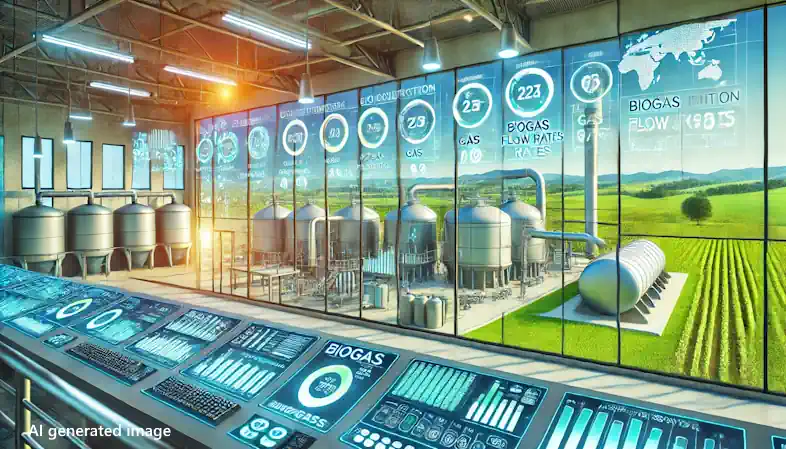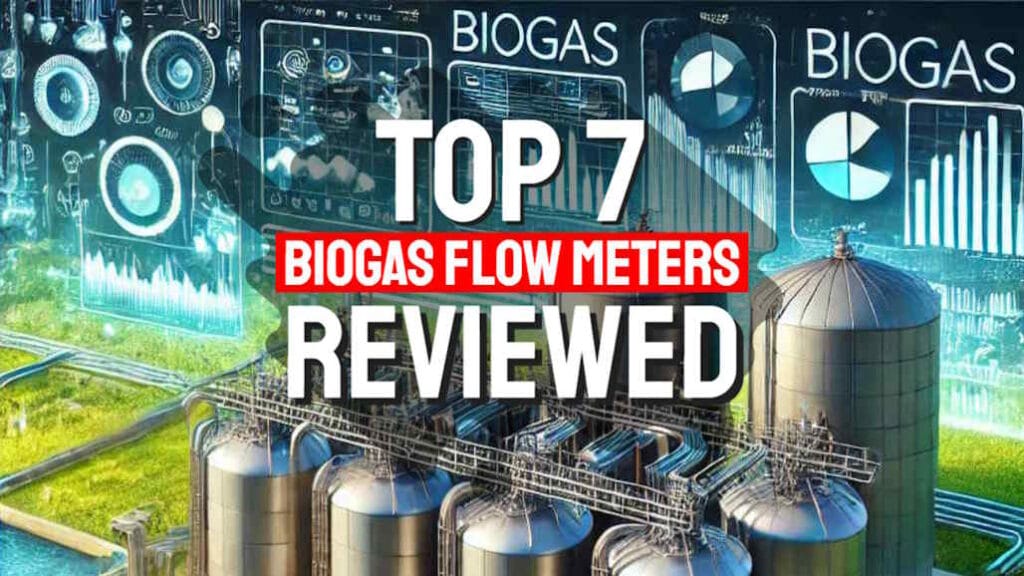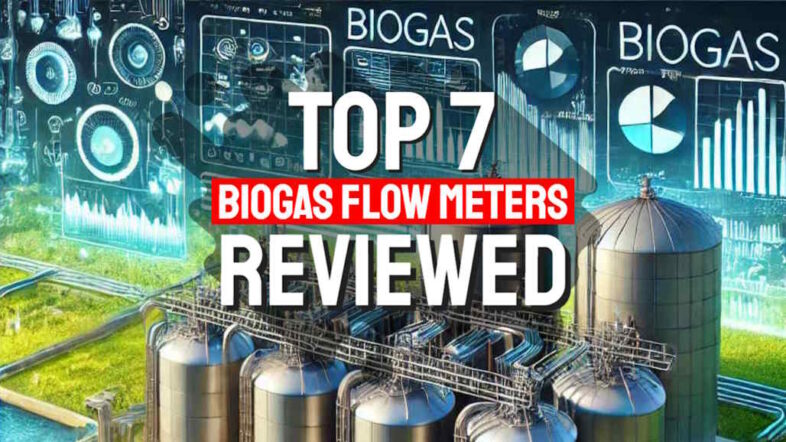A Comprehensive Review of the Top 7 Biogas Flow Meters: Your Definitive Buyer's Guide for 2025.
Did you know that global biogas production is expected to double by 2030? As someone who's spent over a decade depending on the reliability of biogas flow measurement, I've witnessed firsthand how crucial accurate flow meters are for successful operations.
Whether you're managing a wastewater treatment plant or an agricultural digester, choosing the right biogas monitoring system can make or break your efficiency metrics. In this comprehensive guide, I'll walk you through everything you need to know about biogas flow meters, from basic principles to expert recommendations!
Top 7 Biogas Flow Meters Reviewed – Key Takeaways
- Biogas flow measurement requires specialized equipment due to its corrosive nature and variable composition
- Thermal mass and ultrasonic flow meters lead the 2025 market for their accuracy and reliability
- Proper installation and regular maintenance are crucial for accurate measurements
- Consider the total cost of ownership, not just the initial purchase price
- Always ensure ATEX certification for explosion-proof requirements
- Regular calibration and validation are essential for maintaining accuracy
Understanding Biogas Flow Measurement Basics
Let's start with the fundamentals of biogas flow measurement. Unlike measuring clean gases, biogas presents unique challenges due to its variable composition and harsh characteristics. The presence of corrosive elements and varying methane content makes accurate measurement particularly tricky.
Key challenges you'll encounter include:
- Variable gas composition affecting measurement accuracy
- High moisture content interfering with readings
- Wide pressure and temperature fluctuations
- Corrosive elements impacting sensor longevity
When selecting a flow meter for your biogas application, understanding these basics will help you make an informed decision. The right biogas monitoring system should handle these challenges while maintaining accurate measurements.

List of the Top 7 Biogas Flow Meters of 2025
Let's dive into the star performers of 2025! There are a surprisingly large number of ways to measure gas flow! We have assessed the 7 flow metering types that we found, after our extensive reading about testing and real-world validation, (and with a little help from AI tools!) here are our top picks:
- Thermal Mass Flow Meters
- Best for: Direct mass flow measurement
- Accuracy: ±1% of reading
- Highlight: Excellent for low-flow applications
- Price range: $3,000-$5,000
- Ultrasonic Flow Meters
- Best for: Non-intrusive measurement
- Accuracy: ±0.5% of reading
- Highlight: No pressure drop
- Price range: $4,000-$7,000
- Differential Pressure Meters
- Best for: Traditional reliability
- Accuracy: ±2% of reading
- Highlight: Proven technology
- Price range: $1,500-$3,000
- Vortex Flow Meters
- Best for: High-pressure applications
- Accuracy: ±1% of reading
- Highlight: Low maintenance
- Price range: $2,500-$4,500
- Turbine Flow Meters
- Best for: High-flow applications
- Accuracy: ±1.5% of reading
- Highlight: Wide turndown ratio
- Price range: $2,000-$4,000
- Coriolis Flow Meters
- Best for: High-accuracy requirements
- Accuracy: ±0.25% of reading
- Highlight: Direct mass measurement
- Price range: $8,000-$12,000
- Variable Area Flow Meters
- Best for: Budget applications
- Accuracy: ±2.5% of reading
- Highlight: Simple operation
- Price range: $500-$1,500

List of Flow Meter Manufacturers & Models
We researched the following list of Flow Meter Manufacturers and Models, however, we were not able to confirm their suitability for biogas plant applications. Therefore, when using this list simply consider it as the starting point for your enquiries and check thoroughly with each manufacturer for compliance with your requirements before any purchase.
1. Thermal Mass Flow Meters
ENDRESS+HAUSER
- t-mass B 150
- t-mass F 300
SIERRA INSTRUMENTS
- FastFlo 620S Series
- QuadraTherm 640i
2. Ultrasonic Flow Meters
SICK MAIHAK
- FLOWSIC100 Biogas
- FLOWSIC500
FLEXIM
- FLUXUS G721
- FLUXUS G801
3. Differential Pressure Meters
EMERSON/ROSEMOUNT
- 3051SFC
- 3095 MultiVariable
ABB
- 266DSH
- 266CSH
4. Vortex Flow Meters
YOKOGAWA
- digitalYEWFLO
- YF100
KROHNE
- OPTISWIRL 4200
- OPTISWIRL 2100
5. Turbine Flow Meters
HONEYWELL
- Metropack Series
- VersaFlow Series
AW-LAKE COMPANY
- JV-CER Series
- TRG Series
6. Coriolis Flow Meters
MICRO MOTION (EMERSON)
- F-Series
- ELITE Series
RHEONIK
- RHM Series
- RHE Series
7. Variable Area/ Mass Flow Meters
BROOKS INSTRUMENT
- MT3809 Series
- VA Series
KROHNE
- H250 M40
- DK32
Key Features to Consider When Choosing a Biogas Flow Meter
When we researched the biogas flow meters reviewed here we devised our own list of key features we thought important for these devices. As a result, we suggest that when selecting your biogas flow meter, you might wish to consider the following crucial factors:
Measurement Accuracy and Repeatability
Your flow meter's accuracy directly impacts your operation's efficiency. Look for meters offering at least ±2% accuracy for basic applications, though some modern sensors can achieve ±0.25% accuracy.
Operating Ranges
Consider:
- Pressure ranges (typically 0-10 bar)
- Temperature ranges (-20°C to +60°C)
- Flow ranges (specific to your application)
Communication and Data Logging
Modern biogas analysis equipment should offer:
- Digital communication protocols (HART, Modbus, etc.)
- Remote monitoring capabilities
- Data logging systems
- Integration with existing SCADA systems
Installation and Maintenance Best Practices
Proper installation is crucial for optimal performance. Here are key considerations:
Installation Requirements
- Maintain required straight pipe runs (typically 10D upstream, 5D downstream)
- Install in the appropriate orientation
- Consider explosion-proof requirements (ATEX certification)
Maintenance Schedule
- Monthly: Visual inspection
- Quarterly: Calibration check
- Annually: Full calibration and certification
- As needed: Gas flow validation
Industry-Specific Applications
Different industries have varying requirements:
Wastewater Treatment Plants
- Focus on: Corrosion resistance
- Key feature: Moisture handling
- Typical choice: Thermal mass or ultrasonic
Agricultural Digesters
- Focus on: Cost-effectiveness
- Key feature: Simple operation
- Typical choice: Thermal mass or variable area
Landfill Gas Collection
- Focus on: Durability
- Key feature: Wide measurement range
- Typical choice: Thermal mass or vortex
Expert Tips for Optimal Performance
Based on years of field experience, here are my top tips:
- Always consider moisture content in your measurements
- Implement temperature and pressure compensation
- Regular calibration is non-negotiable
- Keep detailed maintenance records
- Train operators properly

Conclusion to “Top 7 Biogas Flow Meters”
Selecting the right biogas flow meter is a crucial decision that impacts your operation's efficiency and bottom line. Consider your specific needs, budget, and long-term maintenance requirements. Remember, the cheapest option isn't always the most cost-effective when you factor in the total cost of ownership.
Need help making your final decision? I'd recommend:
- Define your specific requirements
- Get quotes from multiple manufacturers
- Consider long-term support and maintenance
- Request trial periods when possible
Feel free to reach out in the comments with any questions about biogas flow measurement – I'm always happy to help fellow industry professionals make informed decisions!
Note: Prices mentioned are approximate and may vary based on location, specifications, and market conditions. Always request current quotes from manufacturers or authorized distributors.
Frequently Asked Questions (FAQs)
Q: How often should I calibrate my biogas flow meter?
A: Most manufacturers recommend annual calibration, but the frequency may increase in harsh environments or critical applications. Quarterly validation checks are recommended for optimal performance.
Q: What's the most important factor to consider when choosing a biogas flow meter?
A: The most crucial factor is matching the meter type to your specific application requirements, including flow range, accuracy needs, and environmental conditions. Consider also the total cost of ownership, including maintenance and calibration.
Q: Can I use regular gas flow meters for biogas applications?
A: No, standard gas flow meters aren't recommended for biogas applications. Biogas flow meters are specifically designed to handle the corrosive nature and variable composition of biogas.
Q: Do I need special certifications for biogas flow meter installations?
A: Yes, in most regions, biogas flow meters must be ATEX-certified for explosive atmospheres. Installation should be performed by certified technicians familiar with hazardous area requirements.
Q: What accuracy can I expect from a biogas flow meter?
A: Accuracy ranges from ±0.25% to ±2.5% of reading, depending on the technology used. Coriolis meters offer the highest accuracy, while variable area meters typically provide lower accuracy.
Q: How do moisture levels affect biogas flow measurement?
A: High moisture content can significantly impact measurement accuracy and potentially damage sensors. Most modern biogas flow meters include moisture handling features, but additional gas conditioning may be necessary.
Q: What's the typical lifespan of a biogas flow meter?
A: Most biogas flow meters last 10-15 years with proper maintenance. However, harsh conditions and poor maintenance can significantly reduce this lifespan.
Q: Are there any ongoing maintenance costs I should be aware of?
A: Yes, typical ongoing costs include:
- Annual calibration services
- Replacement parts (sensors, seals)
- Regular cleaning and inspection
- Software updates (for digital systems)
- Potential emergency service calls
Q: Can biogas flow meters handle varying gas compositions?
A: Many modern biogas flow meters include built-in compensation for varying gas compositions. However, extreme variations may require additional gas analysis equipment for optimal accuracy.
Q: What are the common causes of flow meter failure in biogas applications?
A: Common failure causes include:
- Corrosion from hydrogen sulfide
- Moisture damage
- Improper installation
- Lack of regular maintenance
- Operating outside specified ranges
- Physical damage from debris





